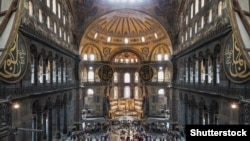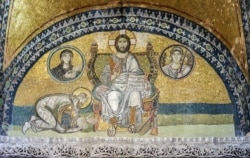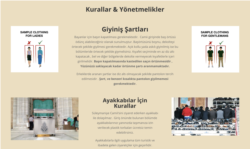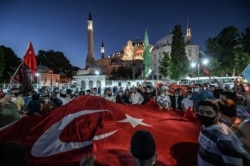On Sunday, July 19, Turkish President Recep Tayyip Erdogan visited Hagia Sophia, Istanbul’s 1,500 year-old place of worship, to inspect preparations for its transition from a UNESCO World Heritage museum into a mosque.
Built in the 6th century as a Christian cathedral, Hagia Sophia was turned into a mosque after the 15th century Ottoman conquest of Constantinople, and then declared a museum by the secular Turkish government of Mustafa Kemal Ataturk in 1934.
On July 17, on President Erdogan’s request, the Turkish high court ruled the decree that gave Hagia Sophia the status of a museum “illegal” and annulled it.
Two hours later, Erdogan signed a decree handing Hagia Sophia over to the department of religious affairs, and then addressed the nation to declare it a mosque and announce that the first prayers there would be held on July 24.
In his half-an-hour speech, Erdogan said Ottoman Sultan Mehmet II’s conquest of Constantinople was the greatest chapter in Turkey’s history and that Hagia Sophia symbolizes that glory. Converting the iconic building into a mosque is Turkey’s historic right and internal affair, he said, condemning those who criticized the move and accusing the Western world of Islamophobia.
Erdogan then gave assurances that Hagia Sophia would remain open to all. “Like all our mosques, the doors of the Hagia Sophia will be wide open to all – locals or foreigners, Muslims or non-Muslims,” he said.
That claim is misleading.
Turkey’s plans do not include sharing the structure, part of a United Nations World Heritage site, with Christians for worship ceremonies. Non-Muslims will only be allowed in as tourists under a strict dress code and visiting hours will be significantly reduced to accommodate five Islamic prayers daily.
The details of new regulations for Hagia Sophia have not been published, and the museum’s government websites maintained by the culture and tourism ministries became inaccessible immediately after the court’s decision.
Turkish government officials have said that the traditional five Islamic prayers will be held daily in Hagia Sophia. During these prayers, Christian symbols will be “obscured” or “veiled,” but also “preserved,” they said.
The officials named the mosaic of the Virgin and Child in the main hall, among other Christian symbols. None of the officials shared details on how this will be done, or whether some of the mosaics will be removed, displayed elsewhere or just temporarily covered.
Erdogan’s assurance that “Hagia Sophia will be open to all,” repeated and amplified by other Turkish officials, appears to refer only to tourists.
Some claimed ending Hagia Sophia’s status as a museum and converting it into a mosque “will not change anything for tourists.”
The claim is not accurate: During Hagia Sophia’s past as a museum, there were no scheduling or dress code restrictions for those visiting it during regular hours. Its conversion into a mosque will significantly impact the rules and regulations for tourists.
Although visitor rules haven’t been specified, they are expected to be similar to those at another of Istanbul’s greatest tourist attractions, the Suleymanyie mosque.
The guidance on Suleymanyie mosque’s website advises all women to cover their heads and bodies before entering, and notes that headscarves and body wraps can be rented at the reception area. Men are forbidden from wearing shorts or sleeveless tops, and all visitors must take off their shoes and carry them in plastic bags.
Visiting hours are strictly adjusted to accommodate the times of Muslim prayers. On normal days, visitors are allowed in from 8:30 a.m. to 11:30 p.m., 1 p.m. to 2:30 p.m., and 3:30 p.m. to 4:45 p.m. On Fridays – the day on which praying at a mosque is obligatory for Muslims – doors open to visitors at 1:30 p.m.
Following international criticism of the change in Hagia Sophia’s status, Erdogan spokesman Ibrahim Kalin said that Hagia Sophia “will always belong to the world historic heritage.”
But UNESCO, the United Nations Educational, Scientific and Cultural Organization, said Turkey’s move is contrary to the “spirit” of “inclusive and equitable participation of communities.”
Turkey’s decision, made without giving UNESCO prior notification, “breaches” its obligations as a World Heritage site state host, UNESCO said in a statement. To “prevent any detrimental effect on the universal value of this exceptional heritage,” the issue “will be examined by the World Heritage Committee at its next session,” UNESCO said.
The U.S. State Department said it “views a change in the status of the Hagia Sophia as diminishing the legacy of this remarkable building and its unsurpassed ability — so rare in the modern world — to serve humanity as a much-needed bridge between those of differing faith traditions and cultures.”
Pope Francis, the Catholic leader, said he was “very saddened” by what is happening in Istanbul.
Modern Turkey was forged under Ataturk as a secular and democratic republic. Since Erdogan first assumed national office as prime minister in 2003, he has worked to reassert Islam as a force in government, education and culture.
Following a failed coup attempt in 2016, Erdogan has pushed Turkey toward autocracy under his Justice and Development Party (AKP), steadily increasing control over the courts, media and state security.









